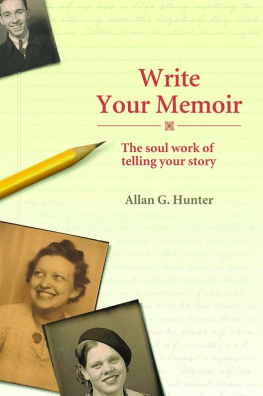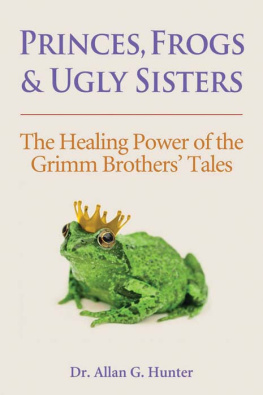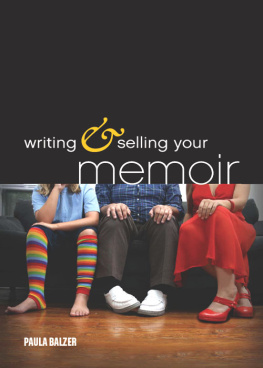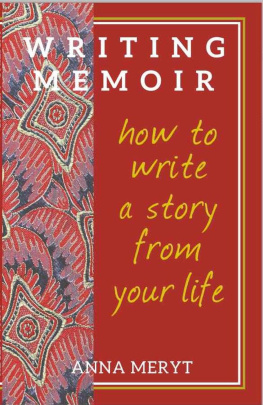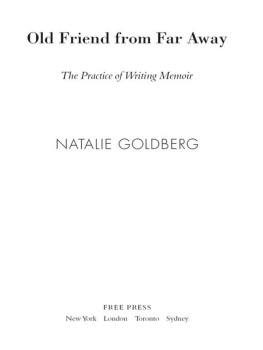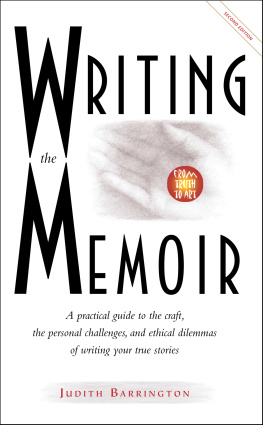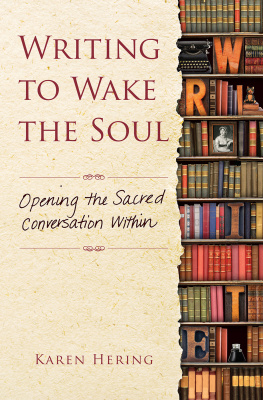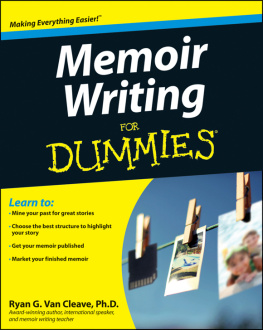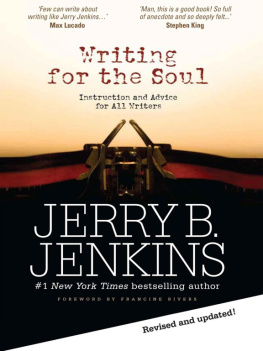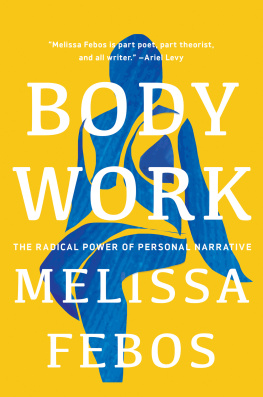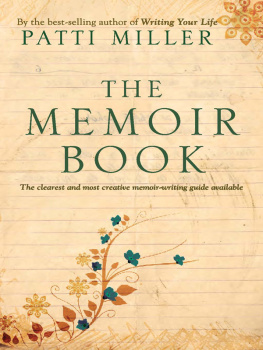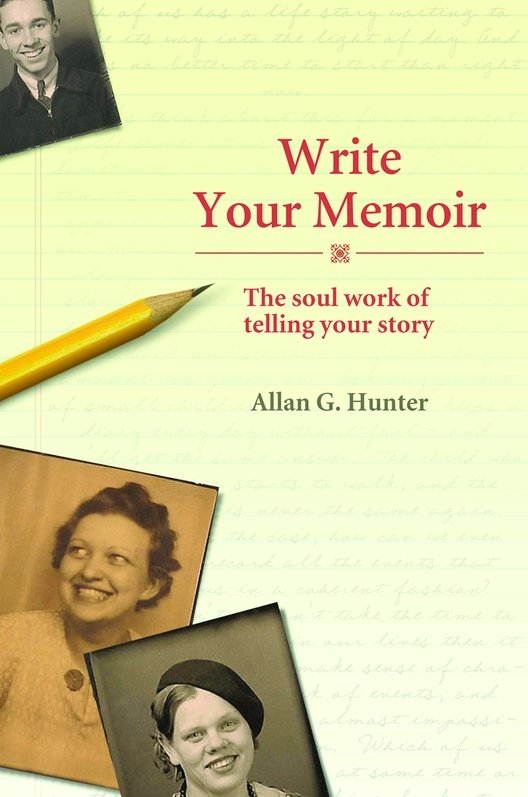Acknowledgments
T here are many people I wish to thank and all have been helpful in very different ways. My gratitude goes first and foremost to Robert Atwan, General Editor of the Best American Essays series, whose inspiration was the starting point for the Blue Hills Writing Institute at Curry College. Without his vision I would never have gone so deeply into the challenges of teaching of Memoir, and so this book would never have come about. Others amongst my colleagues were also influential, and they include Rea Cassidy, Dr. David Fedo, Dr. Connie Griffin, Sandy Kaye, Rebecca McClanahan, Suzanne Strempek Shea (who deserves a special mention), and Dennis Watlington. Support of an administrative nature came from Dr. Lisa Ijiri, Dr. Susan Pennini, Dr. David Potash, Dr. Ruth Sherman, Dr. Judy Stoessel, Steven Beliaef, and Catherine Kemp Sawyer. Id also like to make special mention of Kenny Wightman and Suzie Hackett, who helped me explore memoirs more intricate aspects, and did so with grace and generosity. In addition Id like to mention my late father, who allowed me to work with him on the memoir that later became From Coastal Command to Captivity . Without that experience I might not have been alerted to the ways memoir can effect change at a deep level.
My students, some of whom provided the examples that illustrate this book, and many of whom have now become my friends, were more influential than perhaps they know. My particular thanks go to Madeleine Biondolillo, Vivian Brock, Perry Carrison, Laura Cluff, Ruth Cote, Samantha Crescitelli, Brittany Capozzi, Jane OConnor Deering, Marlena Erdos, Virginia Fuller, Patricia Horwitz, Emma Lown, Alison McLeod, Marilyn Morrissey, Jean Mudge, Alyssa Newton, Ed Orzechowski, Holly Pappas, Jane Perkins, Tel Sandman, Janet Sedgewick, Mary Lou Shields, Diane Snyder, and Cheryl Suchors. If I have missed anyone out I can only apologize and say that it was simply not possible to list everyone here, much as I would have wished to.
To my friends and colleagues who have given such valuable feedback when reading my work I owe a debt of gratitude, too, and these include Professor DavidWhitley of Cambridge University; Andrew Peerless of Oxford University Press, Professors Andrew Horn, Jeffrey Di Iuglio, Jeanette de Jong, and Veronica Guerrero-Macia; to Dr. Laurie Fox, Dr. Peter Hainer, Dr. Bette Manter, Dr. Alan Revering, and Dr. Ronald Warners, all of Curry College; and to my good friends Susan Lax and Douglas Kornfeld, Talbot Lovering and Tina Forbes, Kelly Ferry, and Dr. Martha Duncan. Kaetlyn Wilcox, an extraordinary artist, was generous in providing details of her artistic process that were of real assistance in explaining what happens as we piece together our lives to make sense of it all. Sandie Sedge-beer at Inspired Parenting Magazine and Vara Raleigh at Planet Light Worker were instrumental in keeping the ideas that make up this book flowing. Writing truly is a practice and writing a regular column for these publications helped my creative juices to remain vital and was also a lot of fun.
My wife, Catharine Bennett, deserves special mention as without her support and love and deep wisdom shared over many conversations nothing would ever have been written.
A heartfelt thank you goes to Thierry Bogliolo for his kindness and support of my writing, as well as his belief in the power of books to make the world a better place. I could not ask to find a better publisher nor a more delightful and more cherished friend. To Jane Engel, my editor at Findhorn Press, to Carol Shaw, and to the whole Findhorn team a huge thank you. And to Gail Torr, surely the finest publicist anyone could ever wish for, gratitude, gratitude, and still more gratitude.
I was materially assisted in preparing this book by the generosity of President Kenneth Quigley of Curry College, and the Board of Trustees, who granted me a sabbatical in Spring 2008 during which this book was planned, as well as allowing me Release Time for 2010 to bring the task to completion. I am also grateful to the trustees of the Seth Sprague Educational and Charitable Foundation, and especially Mrs. Arline Greenleaf and Mrs. Rebecca Greenleaf Clapp, as their continued support of the Curry College Honors Program has not only enabled that program to flourish, but also has also permitted me to be able to engage students with questions about identity that, to a large extent, lie at the core of this book. My students learning and mine has intersected in a way that has been beneficial to all concerned, and this could not have happened without such generous support.
Last but not least I would like to thank those who patiently put up with me during this time of writing, particularly my family: Billie Bennett, Grant Bennett and Emily Tabacoff, Nicholas Portnoy, Anna Portnoy, Don and Annatje Hunter, Betty Moorley, Alison and Kenny Portas, Hussein Khan and Maria Szebor, and Monique and Martin Lowe, all of whom gave excellent advice and insights, and were more supportive than they may realize.
Disclaimer
The intention of this work is to instruct and educate writers and readers who wish to explore memoir writing. If the writing exercises cause you the reader emotional distress then I urge you to seek professional help. This book cannot on its own be a substitute for counseling or therapy.
The examples in this book are all actual examples that have been shared in classes and workshops. I have secured permissions from all those I have quoted directly, and in these instances some writers have allowed me to use their real names. To protect the privacy of all the individuals concerned, and in the interests of compression, I have on occasion altered certain facts and details while remaining true to the spirit of the events described.
Other Books by Allan G. Hunter:
Stories We Need to Know
The Six Archetypes of Love
Princes, Frogs & Ugly Sisters
The Sanity Manual
From Coastal Command to Captivity
Bibliography
Memoirs of Interest
H ere are some memoirs that may be of interest. This list was compiled for the Blue Hills Writing Institute with the help of the participants (to whom I am most grateful), who agreed that the selection opened up possible new ideas for ways of writing. It doesnt pretend to be comprehensive or complete, just thought-provoking. Once you start reading youll find that one book leads on to another especially if you talk to your friends about what youve read and follow their recommendations.
Geoffrey Wolff
The Duke of Deception: Memories of My Father
How does one come to terms with the memories of ones father when that person was a confidence trickster, forger, liar, and manufacturer of false memories? The companion book to this is Tobias Wolffs This Boys Life . The two are brothers who barely saw each other after their parents separated when Geoffrey was in his early teens.
Vintage, 1979, 275 pages.
J. R. Ackerley
My Father and Myself
I was born in 1896 and my parents were married in 1919. So starts the memoir of a boys experience of his father, of his fathers secrets, and of the cost of such concealments in terms of trust. Uncompromisingly honest.
Poseidon, 1968, 219 pages.
P. D. James
A Time to be in Earnest: A Fragment of an Autobiography
Based on one entire years diary entries, 1997-98, the famous crime-writer moves between the present and the past in ways that illuminate both. Less a memoir than a way of approaching the tricky task of life assessment.

